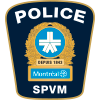
Domestic and intrafamily violence
Domestic and intrafamily violence is unacceptable. We all have a role to play faced with this abuse. We should report it. Criminal accusations may be filed.
If you are a victim or witness of domestic violence, call 911 in an emergency.
If the situation is not urgent, several resources are available for victims and their families or for someone else in need.
If you resort to violence in your relationships, don’t hesitate to ask for help. You can be part of the solution.
As a victim or witness, if you are aware that a perpetrator of violence does not comply with their conditions, call 911 immediately. Note that you can ask to stay anonymous.
If this person does not comply with their conditions and the police is informed, an investigation will be launched.
If you are a victim of domestic violence, know that you are not alone and you will be supported when you decide to break the silence.
Domestic violence invariably follows the same cycle: tension-building, outburst of abuse followed by calm. These episodes end up occurring at increasingly shorter intervals and the abuse gets worse and worse.
At the SPVM, our priority is to ensure your safety and that of you loved ones while breaking the cycle of violence by exposing it.
WHAT IS IT?
Domestic violence includes psychological, verbal, physical and sexual abuse as well as acts of financial domination, and controlling or coercive conduct towards an intimate partner - of the same gender or different gender, or towards this partner’s loved ones, property or pets.
It also applies to cases where the intimate partner is the target of a criminal offence by the suspect, even if they are not the direct victim, e.g., offence committed against the ex-partner’s new spouse.
Domestic violence can be experienced at any age. Actions towards the victim do not result from a loss of control by the perpetrator of violence but on the contrary are a chosen way of dominating the other person and asserting authority over them.
Violence is obliging a person to act against their will, using force, intimidation or fear to control or dominate them. It comes in different forms:
Emotional abuse
intimidating – humiliating – terrorizing – isolating – controlling
Verbal abuse
insulting – saying hurtful things
Physical abuse
shoving – slapping – hitting
Sexual abuse
having unwanted sexual relations
Economic abuse
controlling finances – refusing to give money to the other person
There are many consequences of abuse:
For the victim: getting injured, feeling anxious, depressed, ill. Always feeling scared, losing self-respect and self-confidence, lacking concentration
For the children: being aggressive, depressed and having problems at school
For family members: not having good relations between them and being isolated
WHAT TO DO?
In an emergency, call 911.
- Get help from a professional, such as a doctor, a social worker or a psychologist (see help resources section)
- File a complaint with your neighbourhood police station (PDQ)
- Ask to stay in a shelter by contacting SOS violence conjugale
- If you are a perpetrator of violence and you resort to violence in your relationships, don’t hesitate to get support from resources available for you.
- If you know a victim of domestic violence, report the situation to the police.
Some actions to take before leaving your home
Preparing to leave: a delicate step
Collect your personal belongings accompanied by police officers
By the victim
- The victim may go to their neighbourhood police station to be accompanied by police officers.
- They may be accompanied by a loved one or a professional from a shelter or other organization.
By the perpetrator of violence
- This person must go to a neighbourhood police station to be accompanied by police officers if permitted by their release conditions.
Other Available resources
In an emergency, call 911.
For the victim and their circle of friends and family
Essential resources
Shelters, listening, guidance and referral services, in French and English
Multilingual website
1 800 363-9010, 24/7
Text: 438-601-1211, from 2:30 p.m. to 10 p.m.
CAVAC (Crime Victims Assistance Center)
Support, post-traumatic and psychosocial intervention, and legal information on your rights and remedies, technical assistance and referral to specialized resources
Services also available in English and Spanish
1 866 532-2822
Monday to Friday, 9.00 a.m. to 5.00 p.m.
Free legal consultation for victims of sexual abuse and domestic violence
1 833-REBÂTIR (732-2847)
8.30 a.m. to 4.30 p.m., it is possible to leave a message outside opening hours
DPCP info line on domestic violence and sexual abuse
Free and confidential service to obtain information on the court process, general handling of a police complaint, authorization for criminal prosecution and measures facilitating your testimony to the court as part of a complaint
1 877 547-DPCP (547-3727)
Monday to Friday, 8.30 a.m. to 4.30 p.m.
Director of Youth Protection (DPJ)
Protection of childhood and young people, reporting a child whose safety or development is compromised, help for parents
French-speaking clients: 514 896-3100
English-speaking clients (Batshaw): 514 935-6196
Emergency Financial Assistance Line
For fieldworkers serving victims
1 833 363-5238
24/7
Legal support
AQPV (Association québécoise Plaidoyer-Victimes)
Defending the rights and interests of victims of crime
514 526-9037
Information on family law, separation and divorce
Affordable legal services for people whose financial situation does not allow them to retain the services of a private lawyer
1 855 JURIPOP (587-4767)
Email: reception@juripop.org
Monday to Friday, 8 a.m. to 12 p.m. and from 1 p.m. to 4 p.m.
Housing
Alliance MH2: Alliance of second-stage shelters for women and children victims of domestic violence
Email: info@alliancemh2.org
Support for women from ethnocultural communities who are victims of family violence and their children, and translation and interpretation services
514 274-8117 or 1 877 274-8117
Fédération des maisons d’hébergement pour femmes
Support for member shelters towards achieving their mission, representing and defending member shelters in dealings with the authorities
514 878-9757
514 620-4845
Email: info@rfoi.org
Alternat’Elle: 514 626-4445
Regroupement des maisons pour femmes victimes de violence conjugale
514 878-9134
Email: info@maisons-femmes.qc.ca
Healthcare and psychosocial resources
Your neighbourhood CLSC
Psychosocial services provided by CLSCs across the SPVM’s territory
Free and confidential telephone consultation service responding to questions and guiding, where necessary, to an appropriate resource in the healthcare and social services network
811
24/7
Other resources
Native Friendship Centre of Montreal Inc.
514 499-1854 or 1 855-499-1854
Montreal LGBTQ+ Community Center
Services offered to people from gender and sexual diversity communities
514 528-8424
Email: info@ccglm.org
Services for women from Québec, immigrant women and indigenous women
514 842-4780
Email: spl@centredesfemmesdemtl.org
Chez Doris, women’s shelter foundation
Women experiencing homelessness or in difficulty, Inuit and Indigenous women
514 937-2341
Email: info@chezdoris.org
Confédération des organismes de personnes handicapées du Québec
514 284-0155
Email: info@cophan.org
Native Women's Shelter of Montreal
Montréal 514 933-4688
Toll-free: 1 866-403-4688
Email: nakuset@gmail.com
Services offered to people from gender and sexual diversity communities
514 866-6788
La maison des femmes sourdes de Montréal
514 255-5680
Email: femmessourdes@mfsm.ca
RAPLIQ (Regroupement des activistes pour l'inclusion au Québec)
Defending the rights of people with disabilities
514 656-1664
Email: le.rapliq@gmail.com
Table de concertation en violence conjugale de Montréal
514 303-0328
Email: infos@tcvcm.ca
For the perpetrator of violence
To curb domestic violence on a long-term basis, the SPVM also wants to take preventative action by orienting individuals who resort to violence to help resources provided by the health, social services and community networks.
For many victims, therapeutic treatment of these individuals is important. In addition, many organizations consider that rehabilitation of these individuals is the best way of ensuring public safety in the long term.
Essential resources
Support network for men for a society without violence
1 877-660-7799
Email: info@acoeurdhomme.com
OP+ION
Alternative to domestic and intrafamily violence
514 527-1657
Support services for spouses of violent men (perpetrator and victim)
514 384-6296
Healthcare and psychosocial resources
Your neighbourhood CLSC
Psychosocial services provided by CLSCs across the SPVM’s territory
Free and confidential telephone consultation service responding to questions and guiding, where necessary, to an appropriate resource in the healthcare and social services network
Call 811
24/7
Other resources
Community housing centre aimed at improving the quality of life of adult men in difficulty and at risk of becoming homeless
514 932-2214
Information and Referral Centre of Greater Montréal
514 527-1388
Directory of social programs and resources in the vicinity of the island of Montréal
Free, confidential and multilingual (200 languages)
Call 211
Centre de ressources pour hommes de Montréal
Support, listening and referral services, without judgement, for men in difficulty
514 355-8300
1 833-673-2746 (1 833-OSE-CRHM)
Email: info@crhmontreal.ca
Gradual social integration of inmates under federal jurisdiction who have been granted day parole as part of conditional release on a six-month community project program
514 476-2635
Therapy centre for men who are perpetrators of domestic violence
Short-term shelter is possible in return for an affordable rent
514 655-6625
Email: oxygene@carrefourfamilial.com
Non-profit referral organization reaching out to men and separated fathers experiencing a family transition
514 254-6120
Email: psi@peres-separes.qc.ca
Non-profit community organization encouraging the development of paternal skills by providing the tools required to fathers to create and maintain good relationships with their children
514 381-3511
Email: liaison@repere.org
Regroupement des organismes pour hommes de l’île de Montréal (ROHIM)
438 397-0698
Adult crime services centre
514 270-6633
Text: 514 270-2799
for more information
Technological self-defense guide for victims of IPV
Fact sheet (in 11 languages), SOS violence conjugale
Process for reporting a crime in a conjugal violence context (including a video in 17 languages)
Judicial system, Gouvernement du Québec [in French]
- Support for victims and witnesses of domestic violence
- Anti-approach bracelet
- Violence and bullying, Gouvernement du Québec
Applied, interdisciplinary research on intimate, family and structural violence, Université Laval
Government policy
- Government action plan on domestic violence, 2018-2023, Gouvernement du Québec
- Act together to save lives:
- First annual report by the Domestic Violence Death Review Committee, Coroner’s Office, 2020 [in French]
- Second annual report by the Domestic Violence Death Review Committee, Coroner’s Office, 2022 [in French]
- Rebâtir (Rebuild trust) [in French]
Report of the expert committee on support for victims of sexual assault and domestic violence, 2020 [in French]
- Intervention policy on domestic violence - Prevent, detect and counter domestic violence, Gouvernement du Québec, 1995 [in French]



